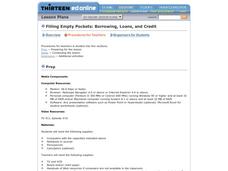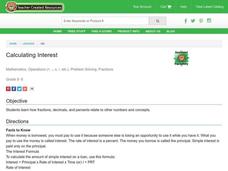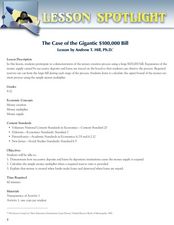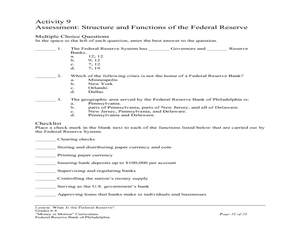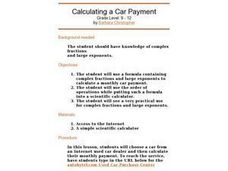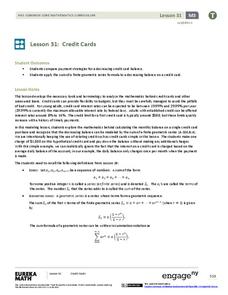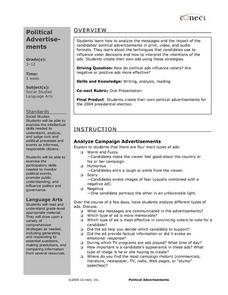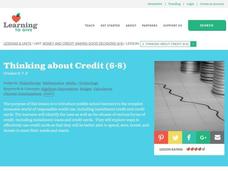Council for Economic Education
Calculating Simple Interest
How much is owed? A calculated resource introduces the simple interest formula with a video that describes how to use it. Classmates then show what they know by answering questions within a simple interest worksheet.
Curated OER
FILLING EMPTY POCKETS: BORROWING, LOANS AND CREDIT.
Students learn that maintaining financial security takes a good math understanding. In this lesson, students apply mathematical formulas to make important financial decisions like getting the right loan to buy a house, decide which...
Curated OER
Chinese New Year: A Simple Lesson in Debt, Percent, and Loan Interest
Students study Chinese New Year traditions while investigating the concepts of percent and loan interest. They apply the concepts to calculate the total debt on monies borrowed.
Curated OER
The Business of Interest
Students explore the concept of simple and compound interest. In this interest lesson, students discuss how interest works on a loan. Students calculate simple and compound interest on loans of fictitious characters from a video.
Curated OER
Compound Interest
Students solve compound interest problems. For this solving compound interest problems lesson, students use TVM Solver on the Ti-83 Plus. Students find the future value of a principal amount at a given interest rate compounded a certain...
Curated OER
Calculating Interest
Students explore the concept that when money is borrowed, people pay to use it because someone else is losing an opportunity to use it while they have it. What you pay to use the money is called interest. The rate of interest is a...
Curated OER
Thinking About Credit
Students explore the concept of credit. In this credit lesson plan, students discuss what it means to buy items using credit. Students discuss how interest accrues and how much is really being paid with a credit card. Students calculate...
TCI
By George!
What better way to learn about George Washington and other United States presidents than with a fun board game? Learners review the accomplishments of Washington's administration through a collaborative board game, as well as draw...
Curated OER
Credit Purchases
Twelfth graders calculate interest on purchases bought with a credit card. They use the formula I=PRT to find the interest. In pairs, they use a flyer to calculate the interest for electronic items.
Federal Reserve Bank
Lesson 3: A Fresh Start
The members of your economics class may be busy earning graduation credits, but the credit they should be concerned about is their financial credit. The third instructional activity in a unit about Hurricane Katrina and other events that...
Curated OER
The Case of the Gigantic $100,000 Bill
Pupils investigate the money creation process and calculate the upper bound of the money creation process using a money multiplier. In this money creation lesson, students use a imitation $100,000 bill. Pupils demonstrate successive...
Curated OER
What Is the Federal Reserve?
Students examine simple bank transactions. In this banking lesson, students analyze banking transactions such as deposits, loans, and how they hold reserves. They participate in simulations of the process of clearing a check and the...
Curated OER
Calculating A Car Payment
Learners choose a car from an Internet used car dealer and then calculate their monthly payment. All the necessary resources and formulas are provided. This is a simple, but practical and effective, lesson for a math or life skills class.
Curated OER
Debt
Fourth graders read a book about debt, credit, and interest rates and write a story about these topics. In this debt and credit lesson, 4th graders read the book Four Dollars and Fifty Cents, define the terms "debt" and "credit," and...
Curated OER
START QUILTING
Young scholars use Start Quilting with Alex Anderson, 2nd Edition to make five simple wall hangings, each exploring different basic piecing techniques. A sampler quilt at the end of the book combines all the basic blocks from the...
EngageNY
Credit Cards
Teach adolescents to use credit responsibly. The 32nd installment of a 35-part module covers how to calculate credit card payments using a geometric series. It teaches terminology and concepts necessary to understand credit card debt.
Curated OER
Political Advertisements
Students are shown how to analyze the messages and the impact of the candidates' politicial adertisements in print, video, and audio formats. They are shown the techniques that candidates use to influence voter decisions and how to...
Curated OER
Thinking About Credit
Students examine the use of credit such as installment purchases and credit cards. For this credit lesson, students learn the vocabulary associated with credit usage such as mortgage, credit report/score, and debit cards. They determine...
Curated OER
Opening A Bank Account
Learners identify the different types of accounts offered by local banks. Students review and define appropriate banking terms when opening an account. Working in pairs, learners role play the proper way to open an account. This...
Council for Economic Education
Econ Ed Link: Calculating Simple Interest
How do banks calculate the amount of interest paid on a loan? In this lesson, students will view a Livescribe Pencast to learn how to find the dollar amount in interest that is due at maturity. This lesson uses different time periods...
Alabama Learning Exchange
Alex: An Interest Ing Math Lesson
Eventually, everyone will need to borrow money for one reason or another. A good understanding of how interest works will go a long way when applying for a loan. In this lesson, young scholars will complete a KWL chart about the purchase...
Alabama Learning Exchange
Alex: Are You Interest Ed?
In this lesson, students will explore simple interest through the use of studying loans and savings accounts. The students will generate the formula I=P x r x t to calculate simple interest on loans. Students will become familiar with...
Federal Reserve Bank
Federal Reserve Bank of Atlanta: Katrina's Classroom: Lesson 3: A Fresh Start
This lesson examines the benefits and importance of access to credit. Using hands-on learning strategies and internet resources, students will calculate simple interest, learn about different types of credit, evaluate a credit card...

